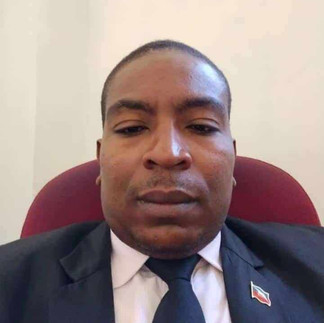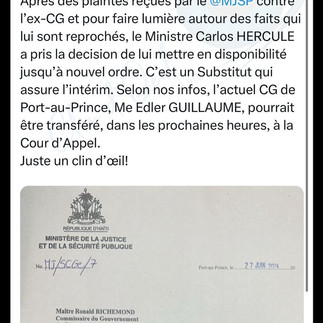The former Haitian Government Commissioner Ronald Richemond needs immediate arrest to prevent potential escape.
- Wilsonn Telimo Lwi

- Jun 27, 2024
- 6 min read
Allegations have been made against former government prosecutor Ronald Richemond of Aux Cayes, Southern Haiti, implicating him in illicit activities, including drug trafficking. These claims are supported by reports from substitute prosecutors, lawyers, journalists, and individuals adversely affected by his abuse of authority. There is concern that if corrupt individuals with knowledge of Richemond's activities within the Ministry of Justice of Haiti are not swiftly held accountable, there may be attempts to shield him from prosecution. Urgent action is needed to apprehend Richemond to prevent the perpetuation and expansion of corruption within Haiti's judicial system. Failure to apprehend him could signify a systemic tolerance for criminal behavior, especially considering allegations involving the conspiracy to assassinate, decapitate, and dispose of the remains of journalist Garry Thès in the southern sea of Aux Cayes, Haiti. Richemond's actions have caused harm to numerous individuals in Aux Cayes.
The actions of Government Commissioner Ronald Richmond have raised concerns regarding his involvement in shielding the gang leader known as "Bout Ba" from Port-au-Prince, possibly to prevent the arrest of the said leader by Miragoane Government Commissioner Ernst Muscadin in Port-Salut, under undisclosed circumstances. Ronald Richmond purportedly engaged in inappropriate behavior, including engaging in a relationship with the partner of a young man in Aux Cayes and subsequently assaulting the said partner due to the man's jealousy. Furthermore, following Richmond's dismissal, there have been reports of him mobilizing his purported gang to incite chaos in the city, potentially manipulating public perception by suggesting that security was more stable during his tenure. Former authorities, including parliamentarians, have been accused of complicity in Richmond's illicit activities, particularly the provision of illegal firearms to youths in disadvantaged areas. These incidents prompt reflection on whether Ronald Richmond effectively operated with impunity above the law.
Several government commissioners with whom I have conversed have alleged that the former government commissioner, Ronald Richmond, conducted arbitrary actions within the judicial system in Les Cayes, Haiti. According to them, Richmond maintains a cadre of preferred attorneys. If a victim seeks a judicial action in Aux Caye's district court, it is imperative to retain legal representation from Richmond's inner circle; failure to do so may result in an unfavorable case outcome. This circumstance was among the chief motivations prompting my premature departure from Aux Cayes after completing my legal studies. The prevailing issue pertains to influence as opposed to the administration of justice. The potential dismissal of Ronald Richmond would signify culpability for wrongful misdemeanors. Should such occur, appropriate accountability must be assumed before any attempts to depart from Haiti. Failing this, the current government prosecutor, James Jean-Louis, could soon be implicated for complicity in these matters. I cannot passively observe these developments and express my intent to refrain from pleading before the new government prosecutor, James Jean-Louis.
According to our understanding of legal proceedings, a Government Commissioner has three methods to initiate public action against a suspect during execution.
1) Direct Subpoena occurs when one individual issues a warrant to another.
2) Confession: Involves the acknowledgment or testimony by the perpetrator of having committed the act.
3) Public Outcry: Refers to the allegation that the act was perpetrated by knowledgeable individuals, as reported by journalists in the news, and supported by blatant evidence and other witnesses.
The former Government Commissioner, Ronald Richmond, resigned and was dismissed a significant period ago following the death of journalist Garry Thès. In a related context, former President Michel Martelly should have been regarded as a suspect, as former senator Gabriel Fortuné of Aux Cayes alleged the involvement of President Jovenel Moise's godfather in Jovenel Moise's demise. Pertinently, the prosecution should have pursued legal action against Gabriel Fortuné for defamation, alongside the involvement of the racketeer André Michel, who made similar allegations against Michel Martelly. Additionally, former President Jean-Bertrand Aristide should also face trial for the death of Leopold Dominique. First Lady Martine Moïse should be subjected to trial for the death of Attorney Dorval, as she disclosed the trustworthy source of the video her husband purportedly received on his phone merely 2 minutes after Mr. Dorval's murder and other related matters.
While in Aux Cayes, I spent four years studying law and two years studying journalism. Although I did not have extensive practical experience, I was actively engaged in the classroom. I can be reached through Esq. Wilson Thelimo Louis. In my third year, I took the oath as a paralegal at the Circuit Court of Aux Cayes and gained practical experience at the Rocourt and Associates law firm in Aux Cayes. Recognizing my motivation, the legal professionals at the firm allowed me to join and learn from them without requiring me to complete my thesis first. It was fortunate that I had a visa, particularly after witnessing an altercation between gang members, including Ronald in Aux Cayes and Dean Vaval at the District Court of Les Cayes. This incident prompted me to recognize that my place was not in that environment. I had no supernatural abilities, weapons, or influential connections within the system.
I am amenable to resuming voluntary work in Haiti at 67. Diverse viewpoints exist regarding the ongoing situation in Haiti. Martine Moise reported that she viewed the video capturing Mr. Dorval's murder within 2 minutes, a revelation corroborated by the late President Jovnel. In compliance with legal and criminal procedures, the apprehension of an individual to elicit their testimony about a crime does not constitute an offense. Nevertheless, individuals who withhold information from authorities assume the role of accomplices and are liable to the same penalties as the principal perpetrators, as stipulated in Article 44 and subsequent articles of the Haitian penal code. A divergence of opinions may arise in response to this discourse. I implore a thorough consideration of the text before forming a definitive stance.
Former President Jean Bertrand Aristide was compelled to disclose information regarding the death of Leopold Dominique to identify the actual perpetrator. Individuals mustn't presume themselves to be above the law. Allegedly, Government Commissioner Ronald Richemond sought retribution against the journalist for exposing abuses of power. For this reason, I am wholeheartedly dedicated to advocating for advancements in the educational system, aiming to empower the people of Haiti with knowledge that enables them to assert their rights. It is vital to remember that the absence of evidence does not confirm the absence of a subject; in other words, the non-observation of something does not indicate its nonexistence. Under prevailing circumstances, I do not intend to return to Haiti. If Haiti were conducive to living, the desire to leave would not persist, particularly in light of individuals like Government Commissioner Ronald Richemond, who, upon my return to Aux Cayes, has threatened my arrest.
Given the presence of former Government Commissioner Ronald Richemond and Chimera Frantz Arthur Mauvais in the streets of Aux Cayes, the futures of talented and innocent young people, such as myself, may be jeopardized. Frantz Arthur Mauvais has threatened me since arriving in Aux Cayes, asserting his alliance with former Government Commissioner Ronald Richemond. To catalyze change in Haiti, we must unwaveringly seek transparency until all injustices are revealed. The prevailing lack of justice in Haiti necessitates the pursuit of justice itself. Such practices are widespread in Aux Cayes. As a legal practitioner, I have observed corruption within the Circuit court. It is imperative to speak out against the prevailing corrupt system, which instills fear and exudes an aura of fatality, to effect change.
I wish to recount a personal incident:
My mother issued a warrant for Majorie and Frantz residing in Lacoriere, Bourry, Torbeck. Subsequently, the police apprehended Frantzley, one of their offspring involved in an assault on my mother and younger brother, and transferred him to the Aux Cayes prosecutor's office. An influential figure, Gwo Sonsonn from Valere, Torbek, intervened at the prosecutor's office, negotiated, and secured the release of the accused. Later, Richemond and deputy prosecutor Wilson detained my mother, keeping her in handcuffs for an entire day, despite her and my brother being the victims of the assault. Surprisingly, the accused was released without further action until my mother was coerced to relinquish a property she had constructed in the vicinity. Upon confronting Richemond, he dispensed false information. It appears that justice in Haiti is heavily influenced by wealth and connections. Furthermore, Richemond warned me that if I had been in Aux Cayes, he would have detained me for exposing his deceit to other attorneys.
Wilson Thelimo Louis,
Juris, a Victim.
SOURCES
The former Haitian Government Commissioner Ronald Richemond needs immediate arrest to prevent potential escape.























Comments